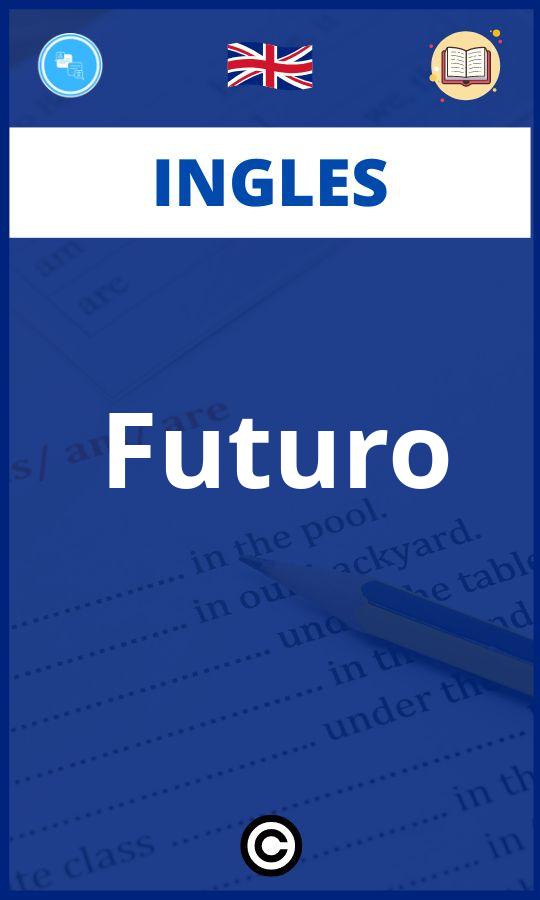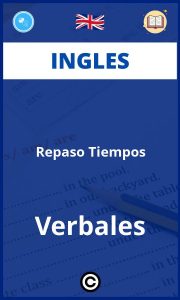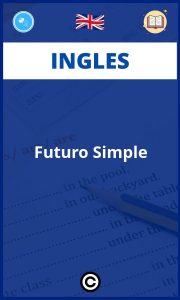
Abrir Ejercicios Ingles Futuro – PDF
Teoria : Ejemplos y Explicacion Futuro Ingles
Inglés Futuro
El inglés tiene varios tiempos verbales que se usan para hablar de acciones que ocurrirán en el futuro. Aprender a usar estos tiempos verbales es esencial para hacerse entender en inglés. ¡Así que vamos a aprender!
Hay tres tiempos verbales principales que se usan para hablar de futuro en inglés: el futuro simple, el futuro continuo y el futuro perfecto. Cada uno de estos tiempos verbales se usa en una situación específica y con un significado particular. Entender cuándo y cómo usar cada tiempo verbal es la clave para hablar de futuro en inglés de manera correcta.
Futuro Simple
El futuro simple se usa para hablar de acciones que ocurrirán en el futuro, especialmente acciones que ocurrirán en un momento específico o que son planeadas. Aquí hay algunos ejemplos de frases en futuro simple:
- I will meet you at the airport at 3pm.
- We will start the meeting at 10am.
- The train will arrive at 6pm.
- I will have a coffee and a bagel for breakfast.
Para formar el futuro simple en inglés, se usa la palabra will seguida del verbo en infinitivo. Por ejemplo:
- I will meet you at the airport.
- We will start the meeting at 10am.
- The train will arrive at 6pm.
- I will have a coffee and a bagel for breakfast.
Futuro Continuo
El futuro continuo se usa para hablar de acciones que estarán ocurriendo en un momento específico en el futuro. Se puede usar el futuro continuo para hablar de planes, pero también para hablar de cosas que estarán sucediendo de manera general en un momento específico. Aquí hay algunos ejemplos de frases en futuro continuo:
- I will be meeting you at the airport at 3pm.
- We will be starting the meeting at 10am.
- The train will be arriving at 6pm.
- I will be having a coffee and a bagel for breakfast.
Para formar el futuro continuo en inglés, se usa la palabra will be seguida del verbo en gerundio. Por ejemplo:
- I will be meeting you at the airport.
- We will be starting the meeting at 10am.
- The train will be arriving at 6pm.
- I will be having a coffee and a bagel for breakfast.
Futuro Perfecto
El futuro perfecto se usa para hablar de acciones que ocurrirán antes de otra acción en el futuro. Se puede usar para hablar de planes, pero también se usa para hablar de cosas que estarán sucediendo de manera general en un momento específico. Aquí hay algunos ejemplos de frases en futuro perfecto:
- I will have met you at the airport at 3pm.
- We will have started the meeting at 10am.
- The train will have arrived at 6pm.
- I will have had a coffee and a bagel for breakfast.
Para formar el futuro perfecto en inglés, se usa la palabra will have seguida del verbo en participio pasado. Por ejemplo:
- I will have met you at the airport.
- We will have started the meeting at 10am.
- The train will have arrived at 6pm.
- I will have had a coffee and a bagel for breakfast.
Usos del Futuro Simple
El futuro simple se usa para hablar de acciones que ocurrirán en un momento específico en el futuro. Se puede usar el futuro simple para hablar de planes, pero también para hablar de cosas que estarán sucediendo de manera general en un momento específico. Aquí hay algunos ejemplos de frases en futuro simple:
- I will meet you at the airport at 3pm.
- We will start the meeting at 10am.
- The train will arrive at 6pm.
- I will have a coffee and a bagel for breakfast.
Para formar el futuro simple en inglés, se usa la palabra will seguida del verbo en infinitivo. Por ejemplo:
- I will meet you at the airport.
- We will start the meeting at 10am.
- The train will arrive at 6pm.
- I will have a coffee and a bagel for breakfast.
Usos del Futuro Continuo
El futuro continuo se usa para hablar de acciones que estarán ocurriendo en un momento específico en el futuro. Se puede usar el futuro continuo para hablar de planes, pero también para hablar de cosas que estarán sucediendo de manera general en un momento específico. Aquí hay algunos ejemplos de frases en futuro continuo:
- I will be meeting you at the airport at 3pm.
- We will be starting the meeting at 10am.
- The train will be arriving at 6pm.
- I will be having a coffee and a bagel for breakfast.
Para formar el futuro continuo en inglés, se usa la palabra will be seguida del verbo en gerundio. Por ejemplo:
- I will be meeting you at the airport.
- We will be starting the meeting at 10am.
- The train will be arriving at 6pm.
- I will be having a coffee and a bagel for breakfast.
Usos del Futuro Perfecto
El futuro perfecto se usa para hablar de acciones que ocurrirán antes de otra acción en el futuro. Se puede usar para hablar de planes, pero también se usa para hablar de cosas que estarán sucediendo de manera general en un momento específico. Aquí hay algunos ejemplos de frases en futuro perfecto:
- I will have met you at the airport at 3pm.
- We will have started the meeting at 10am.
- The train will have arrived at 6pm.
- I will have had a coffee and a bagel for breakfast.
Para formar el futuro perfecto en inglés, se usa la palabra will have seguida del verbo en participio pasado. Por ejemplo:
-
Ejercicios con soluciones de Ingles Futuro
Ejercicios para completar con soluciones de Ingles Futuro
1) Completar con la forma correcta del verbo to be:
I ………….. from Mexico.
You …………. from the United States.
He/She/It …….. from Brazil.
We ………….. from Canada.
They ………… from Argentina.
2) Completar con la forma correcta del verbo to have:
I ………….. two brothers.
You …………. a sister and a brother.
He/She/It …….. a cat.
We ………….. a dog and two cats.
They ………… two brothers and a sister.
3) Completar con la forma correcta del verbo to do:
I ………….. my homework.
You …………. your homework.
He/She/It …….. his homework.
We ………….. our homework.
They ………… their homework.
4) Completar con la forma correcta del verbo to have:
I ………….. breakfast at 7:00 a.m.
You …………. lunch at 12:00 p.m.
He/She/It …….. dinner at 7:00 p.m.
We ………….. a snack at 10:00 p.m.
They ………… breakfast at 6:00 a.m.
5) Completar con la forma correcta del verbo to go:
I ………….. to school by bus.
You …………. to the store by car.
He/She/It …….. to the park by bike.
We ………….. to the movies by train.
They ………… to the beach by foot.
Abrir Ejercicios Ingles Futuro – PDF






